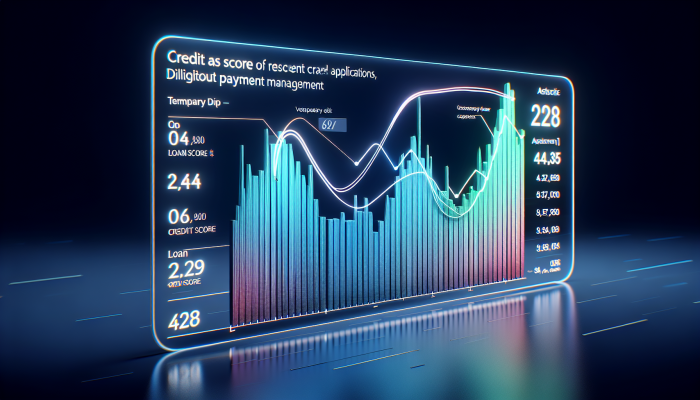Unlock the Secrets of Debt Consolidation to Elevate Your Credit Score: Key Insights
Engaging in debt consolidation is a transformative financial strategy aimed at significantly enhancing your overall financial stability and wellness. It is vital to grasp how debt consolidation affects your credit score to make educated decisions that pave the way for a more secure financial future. By delving into the nuances of your credit score alongside the mechanics of debt consolidation, you can adeptly navigate your financial journey with confidence and strategic foresight. This understanding equips you with the power to make choices that not only address your immediate debt challenges but also position you for sustainable financial prosperity in the long run.
Evaluating Immediate Impacts of Debt Consolidation on Your Credit Score

As you commence your debt consolidation journey, it is common to encounter a temporary decline in your credit score. This initial dip is typically attributed to hard inquiries made when you apply for new credit accounts, such as a personal loan or a balance transfer credit card. Lenders perform these inquiries to evaluate your creditworthiness, and each inquiry can lead to a marginal reduction in your score. It is crucial to recognize that while this decrease may be disconcerting, it is generally a fleeting setback rather than a permanent impairment.
The initial drop in your credit score can be particularly stress-inducing, especially if you are already facing financial hardships. Nevertheless, you can effectively mitigate this early decline by managing your consolidated debt wisely and ensuring that you make timely payments. As you consistently honor your commitments on the new loan or credit card, the impact of the hard inquiry will diminish, leading to an eventual improvement in your score. This phase demands patience and a steadfast commitment to achieving your financial objectives.
Maximizing Long-Term Benefits of Debt Consolidation to Enhance Credit Utilization
One of the most substantial long-term advantages of debt consolidation is its capability to lower your credit utilization ratio. This critical metric assesses the ratio between your total credit card balances and your total available credit, and it plays an essential role in determining your credit score. A reduced credit utilization ratio indicates to lenders that you manage credit responsibly, thereby significantly improving your credit profile over time.
When you consolidate your debt, especially by eliminating high-interest credit cards, you will noticeably decrease your outstanding balances. This reduction leads to a healthier credit utilization ratio, ideally keeping it below 30%. By maintaining a low utilization rate, you not only boost your credit score but also establish yourself as a lower-risk borrower in the eyes of financial institutions.
However, maintaining this low utilization level after consolidation is critical. Should you begin to accrue new debt on your credit cards post-consolidation, you run the risk of undermining the positive effects on your credit score. Therefore, a disciplined approach to managing your credit after consolidation is vital for achieving lasting financial success.
Recognizing the Importance of Payment History in Achieving Debt Consolidation Goals
Your payment history constitutes the most significant factor influencing your credit score, accounting for approximately 35% of your FICO score. Thus, utilizing debt consolidation to create a manageable payment plan can substantially enhance your credit profile. By consolidating your debts, you simplify your financial obligations into a single monthly payment, facilitating better organization and control over your finances.
Consistently making on-time payments following consolidation will have a favorable impact on your credit score. Each punctual payment contributes positively to your payment history, helping to counterbalance any initial negative effects stemming from hard inquiries. The longer you maintain a robust payment history, the more pronounced its influence will become in determining your overall credit score.
While this process necessitates discipline and perseverance, the ultimate reward is a healthier credit score and an enhanced financial standing. Therefore, it is beneficial to regard debt consolidation as a strategic instrument rather than a temporary remedy, as it has the potential to yield remarkable long-term benefits.
Exploring Diverse Debt Consolidation Options and Their Impact on Credit Scores

Gaining a thorough understanding of the various debt consolidation methods is imperative, as each approach carries specific implications for your credit score. By investigating these options, you can make informed decisions that align with your financial goals and unique circumstances.
Leveraging Personal Loans for Effective Debt Consolidation Solutions
Personal loans are a widely favored option for debt consolidation, allowing you to combine multiple high-interest debts into a single loan with a fixed interest rate. This method can produce varying effects on your credit score. When you apply for a personal loan, it triggers a hard inquiry, potentially resulting in a slight decline in your score. However, as you begin making regular payments, the positive impact on your credit score can be substantial.
Furthermore, personal loans typically offer lower interest rates compared to credit cards, enabling you to save on interest expenses while effectively reducing your total debt. As you work towards paying down your consolidated debt, your credit utilization ratio improves, further boosting your credit score.
It is crucial, however, to avoid incurring new debt while repaying your loan. This practice ensures that you fully capitalize on the benefits of debt consolidation while preserving a healthy credit score.
Utilizing Balance Transfer Credit Cards for Effective Debt Consolidation
Balance transfer credit cards offer an attractive option for consolidating debt. These cards allow you to transfer high-interest credit card balances to a new card with a lower interest rate, often featuring an introductory 0% APR. This strategy can significantly reduce your interest payments, though it also involves certain credit score considerations.
When you apply for a balance transfer card, a hard inquiry is initiated, which can temporarily impact your credit score. However, should you manage to pay off your transferred balance within the promotional period, you stand to gain considerable savings. Additionally, this method can lower your credit utilization ratio, positively affecting your score, provided you maintain low balances on your other credit cards.
Conversely, if you fail to pay off the balance before the promotional period concludes, the interest rate may surge dramatically, leading to increased payments that could strain your financial resources. Moreover, maxing out your new balance transfer card could adversely affect your credit utilization ratio, resulting in a negative impact on your score.
Employing Home Equity Loans for Strategic Debt Consolidation

Home equity loans provide yet another pathway for debt consolidation, allowing you to tap into the equity in your home as collateral to secure a loan. This option can offer lower interest rates, which is beneficial for managing high-interest debts, but it also comes with unique risks and implications for your credit score.
While a home equity loan can help decrease your credit utilization ratio and enhance your score, the risk of losing your home in case of default is substantial. Similar to other consolidation methods, applying for a home equity loan results in a hard inquiry, which temporarily lowers your credit score.
It is crucial to evaluate your overall financial situation carefully before pursuing this option. If you are confident in your capacity to handle the payments and avoid accruing additional debt, a home equity loan can serve as a valuable resource for consolidating debt while simultaneously improving your credit score.
Proven Tactics to Minimize Adverse Effects on Your Credit Score During Debt Consolidation
Implement the following strategies to ensure that your debt consolidation journey enhances rather than detracts from your credit score. These practices will aid you in navigating the complexities of consolidation while protecting your financial health and future.
Choosing the Best Debt Consolidation Method Tailored to Your Needs
Selecting the most appropriate debt consolidation method is essential for minimizing negative repercussions on your credit score. Take the time to thoroughly assess various approaches, weighing their advantages and disadvantages in relation to your individual financial circumstances.
For instance, a personal loan may be a suitable option if you possess a stable income and a solid credit profile due to its generally lower interest rates. On the other hand, a balance transfer credit card with a lower limit could be more beneficial if your credit is not at its best.
Conduct extensive research on different lenders, scrutinize the fine print, and ensure that you fully comprehend the terms and conditions associated with each option. This diligence will empower you to select a method that aligns with your financial objectives while minimizing any adverse impact on your credit score.
Maintaining a Low Credit Utilization Ratio After Consolidation
Once you complete your debt consolidation, it is crucial to maintain a low credit utilization ratio to safeguard your credit score. An effective strategy involves avoiding the accrual of new debt on your credit cards while you are repaying your consolidated loan. This practice helps keep your credit utilization low, positively influencing your credit score.
Additionally, consider using budgeting tools to track your spending habits and ensure that you live within your means. By maintaining low credit card balances and making timely payments, you reinforce a positive credit history, something that lenders highly value.
Another practical approach is to request credit limit increases on your existing credit cards. This can enhance your total available credit, which in turn lowers your credit utilization ratio, provided you avoid increasing your spending.
Building a Robust Payment History to Enhance Your Credit Score
A strong payment history is crucial for improving your credit score after debt consolidation. Throughout the debt consolidation process, commit to making regular, on-time payments. This dedication will not only elevate your credit score but also instill a sense of financial discipline and responsibility.
Consider implementing automatic payments for your consolidated loan or credit card to ensure you never miss a due date. Regularly monitoring your accounts can provide additional peace of mind, allowing you to address any potential issues before they escalate.
Remember, a positive payment history signals to lenders that you are a responsible borrower. Over time, this can lead to increased creditworthiness and the potential for more favorable loan terms.
Real-Life Illustrations: Analyzing the Impact of Debt Consolidation on Credit Scores
To fully grasp the implications of debt consolidation on credit scores, let us consider real-life scenarios and case studies. These examples will demonstrate how individuals have navigated the intricacies of consolidation and the subsequent effects on their credit scores.
Case Study: Navigating High-Interest Credit Card Debt Challenges
Consider Jane, who was overwhelmed by excessive high-interest credit card debt. With several cards maxed out and monthly payments spiraling out of control, Jane opted to pursue a personal loan for debt consolidation.
Initially, Jane’s credit score experienced a dip due to the hard inquiry resulting from her loan application. However, as she diligently made timely payments on her new loan, her credit score began to recover. Within a year, her credit utilization ratio decreased significantly, resulting in a noticeable enhancement in her credit score.
Through disciplined financial management, Jane successfully transformed her financial landscape, leveraging debt consolidation to regain control over her credit.
Case Study: Simplifying Student Loan Payments for Improved Management
A recent graduate, Mark, faced the difficulty of managing multiple student loans with varying interest rates. He chose student loan consolidation to streamline his payments and potentially lower his interest costs.
Initially, Mark experienced a slight dip in his credit score due to the hard inquiry associated with his consolidation efforts. However, his credit score gradually improved as he made consistent payments on the consolidated loan. Mark maintained a healthy credit utilization ratio by avoiding new debt, illustrating the positive impact of consolidation on his credit profile.
This case exemplifies how strategic debt consolidation can yield favorable outcomes for credit scores, particularly for young borrowers.
Case Study: Effectively Managing Multiple Small Debts
Sarah had accumulated various small debts from personal loans and credit cards. She opted for a balance transfer credit card with an introductory 0% APR to consolidate these obligations.
While her credit score temporarily declined due to the hard inquiry, Sarah successfully paid off her transferred balance before the promotional period concluded. As a result, her credit utilization ratio improved, and her credit score steadily increased.
Sarah’s experience underscores the importance of effectively managing consolidation techniques and highlights the significant potential for improved credit scores through disciplined financial behavior.
Clearing Up Common Misconceptions Surrounding Debt Consolidation and Credit Scores
As with any financial topic, numerous myths cloud the understanding of debt consolidation and its effects on credit scores. Let us address some of the most prevalent misconceptions to gain a clearer perspective on this financial strategy.
Myth: Debt Consolidation Inevitably Leads to a Lower Credit Score
A common belief is that debt consolidation inherently results in decreased credit scores. While it is accurate that hard inquiries can temporarily affect your score, debt consolidation can ultimately foster long-term improvements. By prioritizing responsible payment habits and reducing your credit utilization ratio, you can significantly enhance your credit profile.
Understanding this nuance is essential for making informed decisions regarding your debt management strategies.
Myth: All Debt Consolidation Techniques Yield Identical Outcomes
Another widespread misconception is that every debt consolidation method produces the same effects on your credit score. Different options—personal loans, balance transfers, and home equity loans—carry distinct implications for your credit profile.
Each method has its own benefits and drawbacks, making it essential to evaluate them based on your specific financial situation and objectives. A personalized approach to debt consolidation can maximize its benefits for your credit score.
Myth: Debt Consolidation Erases Your Debt History
Some individuals mistakenly believe that debt consolidation eliminates their debt history, providing a clean slate. In reality, consolidating your debts does not erase your previous payment history or existing balances; it simply combines them into a more manageable form.
Your credit report will still reflect your past debts, and responsible management of the consolidated debt is critical for demonstrating your creditworthiness. Recognizing this fact can help you approach debt consolidation with realistic expectations.
Addressing Common Questions About Debt Consolidation and Its Impact on Credit Scores
How Long Will It Take for My Credit Score to Recover Following Consolidation?
Your credit score can typically take several months to bounce back after debt consolidation. The recovery timeline varies based on your payment patterns and overall credit utilization.
Can Debt Consolidation Improve My Chances of Obtaining Better Loan Rates?
Absolutely, consolidating your debt can enhance your credit score, making you a more attractive borrower. This improvement may allow you to qualify for more favorable loan rates.
What Should I Do if My Credit Score Declines After Consolidation?
If you observe a drop in your credit score following consolidation, concentrate on making prompt payments and keeping low credit utilization. Over time, these actions can assist in rebuilding your score.
Is Debt Consolidation Suitable for Everyone?
Debt consolidation may not be the best strategy for everyone. It is crucial to assess your financial situation, including your debts, income, and spending habits, before determining if this approach is appropriate for you.
Can I Consolidate Both Student Loans and Credit Card Debt Simultaneously?
While student loans and credit card debts can be consolidated, they typically necessitate different methods. To optimize potential benefits, consider specific options tailored to each type of debt.
Will Debt Consolidation Affect My Ability to Obtain New Credit?
Initially, debt consolidation may influence your ability to secure new credit due to hard inquiries. However, with responsible management of consolidated debt, your creditworthiness can improve over time.
Are There Fees Associated with Debt Consolidation?
Some debt consolidation methods may incur fees, such as balance transfer or loan origination fees. It is crucial to be aware of these costs before proceeding with the consolidation process.
How Can I Identify a Reliable Debt Consolidation Service?
Research and compare various debt consolidation services, focusing on reviews and ratings from reputable sources. Ensure that the service is transparent about fees and offers a realistic plan for managing your debts.
Can I Consolidate Debts Without a Strong Credit Score?
While a solid credit score simplifies the consolidation process, options exist for individuals with poor credit. Consider secured loans or collaborating with credit counselors to develop personalized strategies.
Can Debt Consolidation Serve as a Long-Term Solution?
Debt consolidation can be part of a long-term financial strategy, but it requires ongoing discipline and responsible management. Use it as a stepping stone toward a healthier financial future.
Connect with Us on Facebook
This Article Was First Found On: https://www.debtconsolidationloans.co.uk
The Article Debt Consolidation’s Impact on Your Credit Score Was Found On https://limitsofstrategy.com
The Article Debt Consolidation Effects on Your Credit Rating First Appeared ON
: https://ad4sc.com
Comments are closed